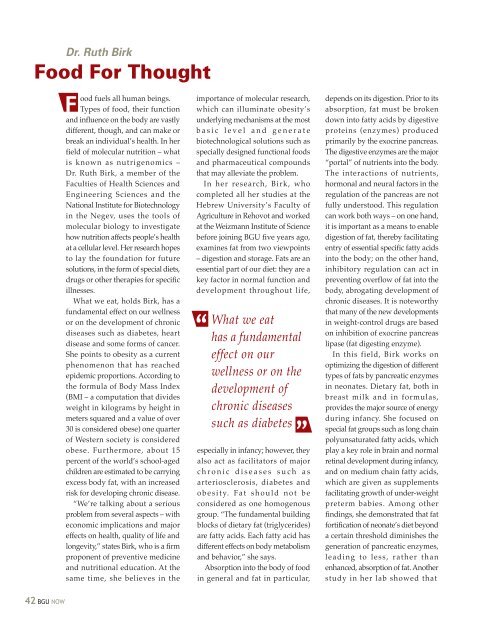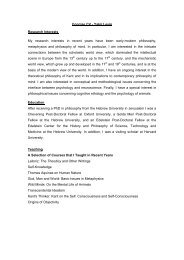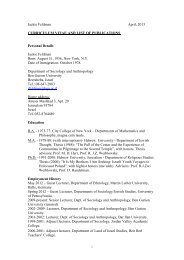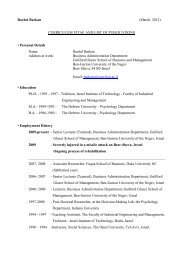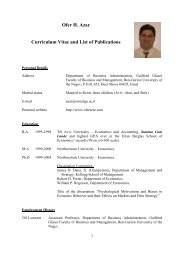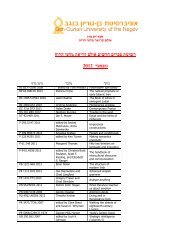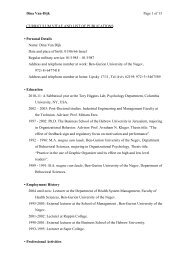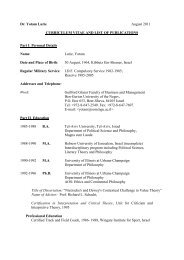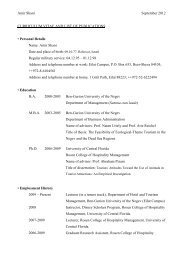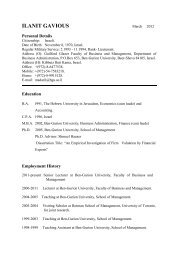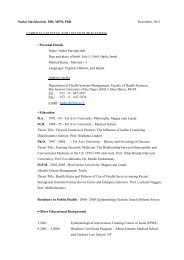cover 2006
cover 2006
cover 2006
Create successful ePaper yourself
Turn your PDF publications into a flip-book with our unique Google optimized e-Paper software.
Dr. Ruth Birk<br />
Food For Thought<br />
42 BGU NOW<br />
F<br />
ood fuels all human beings.<br />
Types of food, their function<br />
and influence on the body are vastly<br />
different, though, and can make or<br />
break an individual’s health. In her<br />
field of molecular nutrition – what<br />
is known as nutrigenomics –<br />
Dr. Ruth Birk, a member of the<br />
Faculties of Health Sciences and<br />
Engineering Sciences and the<br />
National Institute for Biotechnology<br />
in the Negev, uses the tools of<br />
molecular biology to investigate<br />
how nutrition affects people’s health<br />
at a cellular level. Her research hopes<br />
to lay the foundation for future<br />
solutions, in the form of special diets,<br />
drugs or other therapies for specific<br />
illnesses.<br />
What we eat, holds Birk, has a<br />
fundamental effect on our wellness<br />
or on the development of chronic<br />
diseases such as diabetes, heart<br />
disease and some forms of cancer.<br />
She points to obesity as a current<br />
phenomenon that has reached<br />
epidemic proportions. According to<br />
the formula of Body Mass Index<br />
(BMI – a computation that divides<br />
weight in kilograms by height in<br />
meters squared and a value of over<br />
30 is considered obese) one quarter<br />
of Western society is considered<br />
obese. Furthermore, about 15<br />
percent of the world’s school-aged<br />
children are estimated to be carrying<br />
excess body fat, with an increased<br />
risk for developing chronic disease.<br />
“We’re talking about a serious<br />
problem from several aspects – with<br />
economic implications and major<br />
effects on health, quality of life and<br />
longevity,” states Birk, who is a firm<br />
proponent of preventive medicine<br />
and nutritional education. At the<br />
same time, she believes in the<br />
importance of molecular research,<br />
which can illuminate obesity’s<br />
underlying mechanisms at the most<br />
basic level and generate<br />
biotechnological solutions such as<br />
specially designed functional foods<br />
and pharmaceutical compounds<br />
that may alleviate the problem.<br />
In her research, Birk, who<br />
completed all her studies at the<br />
Hebrew University’s Faculty of<br />
Agriculture in Rehovot and worked<br />
at the Weizmann Institute of Science<br />
before joining BGU five years ago,<br />
examines fat from two viewpoints<br />
– digestion and storage. Fats are an<br />
essential part of our diet: they are a<br />
key factor in normal function and<br />
development throughout life,<br />
What we eat<br />
has a fundamental<br />
effect on our<br />
wellness or on the<br />
development of<br />
chronic diseases<br />
such as diabetes<br />
especially in infancy; however, they<br />
also act as facilitators of major<br />
chronic diseases such as<br />
arteriosclerosis, diabetes and<br />
obesity. Fat should not be<br />
considered as one homogenous<br />
group. “The fundamental building<br />
blocks of dietary fat (triglycerides)<br />
are fatty acids. Each fatty acid has<br />
different effects on body metabolism<br />
and behavior,” she says.<br />
Absorption into the body of food<br />
in general and fat in particular,<br />
depends on its digestion. Prior to its<br />
absorption, fat must be broken<br />
down into fatty acids by digestive<br />
proteins (enzymes) produced<br />
primarily by the exocrine pancreas.<br />
The digestive enzymes are the major<br />
“portal” of nutrients into the body.<br />
The interactions of nutrients,<br />
hormonal and neural factors in the<br />
regulation of the pancreas are not<br />
fully understood. This regulation<br />
can work both ways – on one hand,<br />
it is important as a means to enable<br />
digestion of fat, thereby facilitating<br />
entry of essential specific fatty acids<br />
into the body; on the other hand,<br />
inhibitory regulation can act in<br />
preventing overflow of fat into the<br />
body, abrogating development of<br />
chronic diseases. It is noteworthy<br />
that many of the new developments<br />
in weight-control drugs are based<br />
on inhibition of exocrine pancreas<br />
lipase (fat digesting enzyme).<br />
In this field, Birk works on<br />
optimizing the digestion of different<br />
types of fats by pancreatic enzymes<br />
in neonates. Dietary fat, both in<br />
breast milk and in formulas,<br />
provides the major source of energy<br />
during infancy. She focused on<br />
special fat groups such as long chain<br />
polyunsaturated fatty acids, which<br />
play a key role in brain and normal<br />
retinal development during infancy,<br />
and on medium chain fatty acids,<br />
which are given as supplements<br />
facilitating growth of under-weight<br />
preterm babies. Among other<br />
findings, she demonstrated that fat<br />
fortification of neonate’s diet beyond<br />
a certain threshold diminishes the<br />
generation of pancreatic enzymes,<br />
leading to less, rather than<br />
enhanced, absorption of fat. Another<br />
study in her lab showed that


